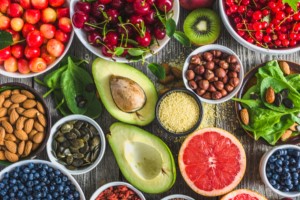
There are a lot of things you can do to protect and maintain your vision. Cutting back on unhealthy choices like drinking and smoking is a good place to start.
So is wearing the correct safety eyewear and sunglasses that are UV protected. One thing that people overlook the most? Their diet! Not eating the right foods can lead to obesity, but it can also hurt your eyesight. Keep reading for some of the most important nutrients to include in your diet to protect your eyes!
Vitamin A, C, and E
Vitamins are essential to healthy vision, and different vitamins play different roles. Vitamin A helps keep the cornea clear. Though it is rare to have a serious vitamin A deficiency if you do, it can lead to a condition called xerophthalmia.
This is a progressive eye disease that causes you to lose your ability to see at night. It eventually worsens to the point that your cornea becomes soft. If this happens, permanent vision loss occurs. Both vitamins C and E are powerful antioxidants. Antioxidants help counteract free radicals, which are unstable molecules that harm your body.
An imbalance between antioxidants and free radicals leads to oxidative stress. Oxidative stress causes many eye problems. Vitamin C also aids in the production of a protein called collagen. Collagen is important because it provides structure to your sclera and cornea.
You’ll find Vitamin A in sweet potatoes, pumpkins, peppers, and leafy green vegetables. Vitamin C is often found in tropical citrus fruits, bell peppers, broccoli, and kale. Nuts, seeds, salmon, avocado and leafy green vegetables contain vitamin E.
Omega-3 Fatty Acids
While many people try to avoid eating fat, healthy fats are vital in maintaining good health. Omega-3 fatty acids, in particular, fight against inflammation. This can help reduce instances of dry eye among other vision benefits.
Fatty fish like salmon, tuna, and sardines are an excellent source of omega-3 fatty acids. You can also find omega-3 fatty acids in walnuts, flaxseed, and chia seeds.
Lutein and Zeaxanthin
Lutein and zeaxanthin help reduce the risk of macular degeneration and cataracts. They are carotenoids or yellow and red pigments found in plant life. They are also excellent antioxidants.
Green and yellow vegetables like kale, spinach, collards, and swiss chard contain high amounts of lutein and zeaxanthin.
Zinc
Zinc is a necessary mineral that makes vitamin A so effective. It is a “helper” molecule that delivers vitamin A from the liver to the retina, which produces melanin.
That melanin then forms a protective pigment in the eyes. Zinc deficiency can lead to cataracts and difficulty seeing at night. Zinc also appears to slow the effects of macular degeneration in some people. Zinc can be found in red meats, seafood, poultry, eggs, tofu, beans, and a variety of nuts.
Want to keep your eyes in their best shape? Schedule an appointment at New York Eye Specialists in New York City! We can discuss whether you’re a candidate for a procedure like LASIK or something similar.




